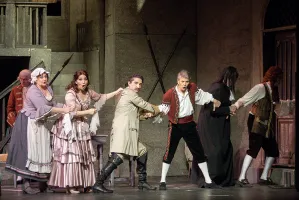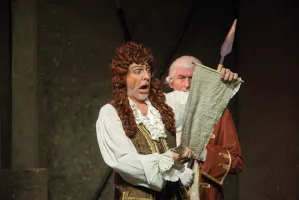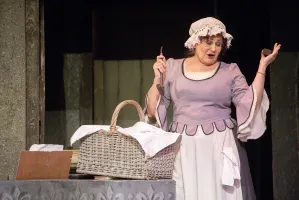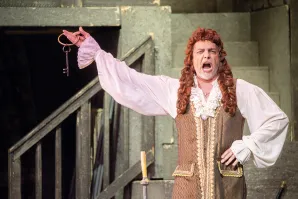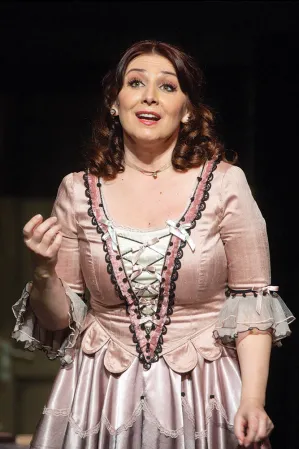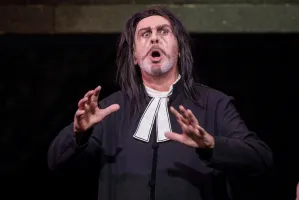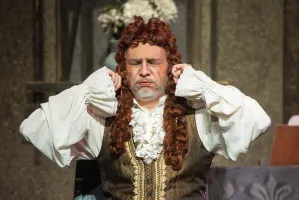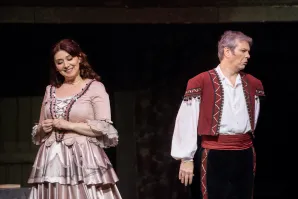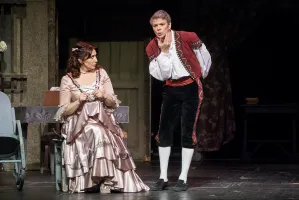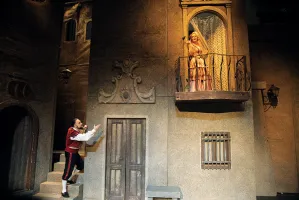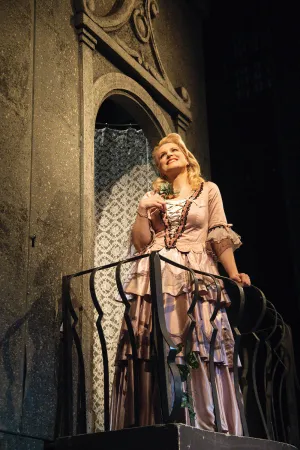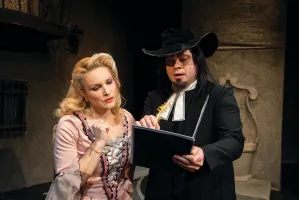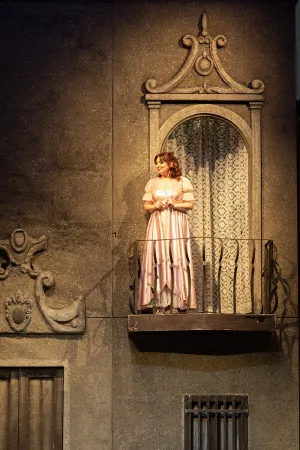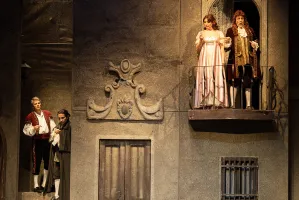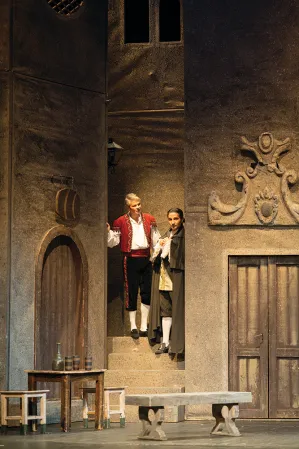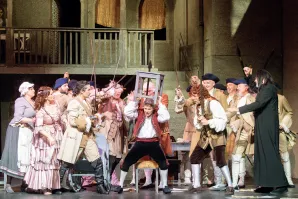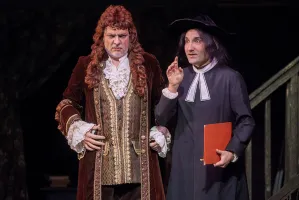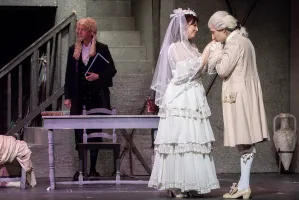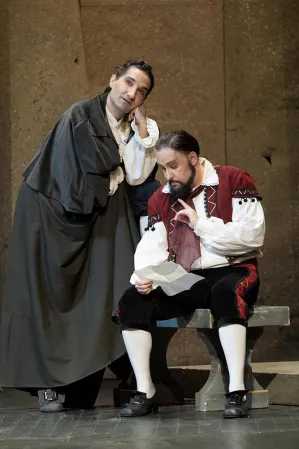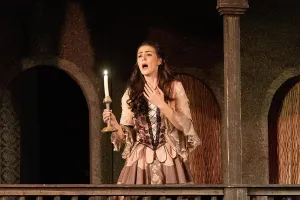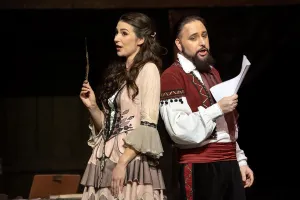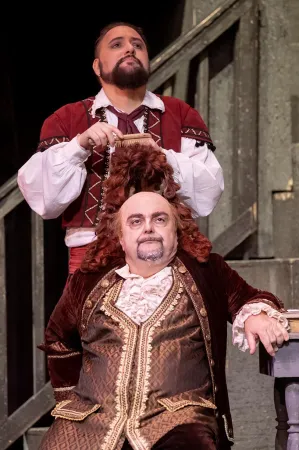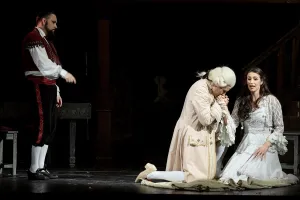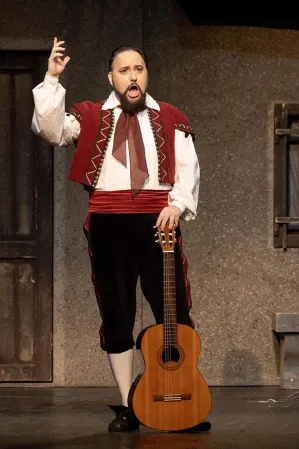Il Barbiere di Siviglia
opera by Gioacchino Rossini
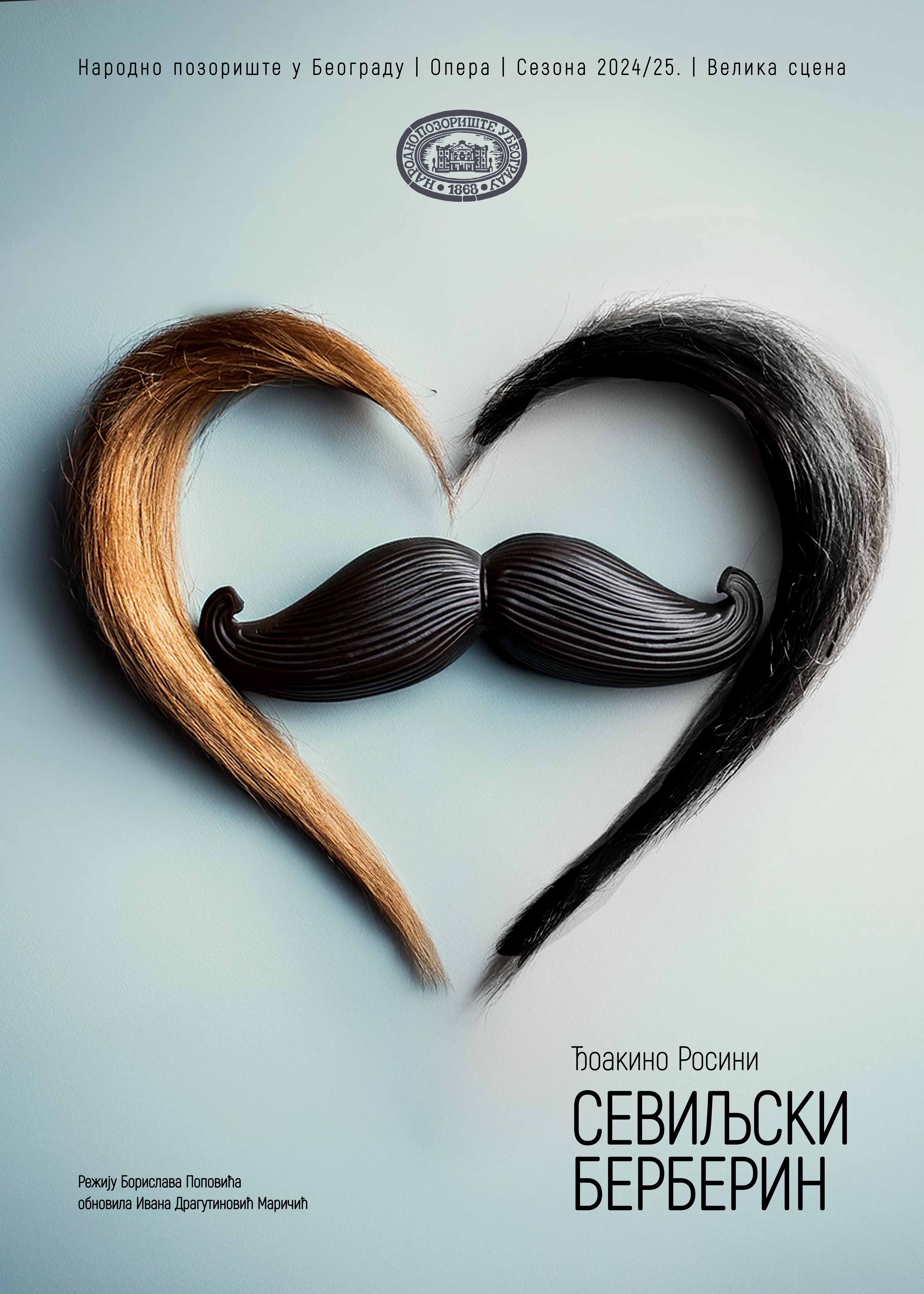
Rossini’s boundless joy of life
Heinrich Heine said “The Barber of Seville is the Sun of Italy”. Yet, this opera by Rossini, which truly is pure joy, was infamously accepted when it was performed for the first time in February 20, 1816 at the Teatro Argentina in Rome. It was a staged failure. Namely, although several composers had composed The Barber of Seville before him (which was the common practice at the time of great production of opera pieces) the most famous was the The Barber of Seville by Giovanni Paisiello from 1782. Although expressing great respect for this, as he said “immortal author” and called his work Almaviva, it was not enough for the aficionados of Paisiello’s work. They all came to the premiere to express their anger, to boo the piece, without paying any attention to the actual performance. It also helped that the evening was plagued with mishaps. During Almaviva's serenade, a guitar string broke. Don Basilio stumbled and fell, performing the Aria on Slander with a bleeding nose, and then a stray cat wandered onto the stage, which they couldn't chase away. All this happened in front of the composer, who was the conductor and harpsichordist that night. The next performance, when the audience truly wanted to see the new work, Rossini experienced triumph, and this opera remains one of the most performed and successful comic operas in the world to this day. His first opera, Marriage Contract (1810), was written at the young age of 18. This was followed by significant success with the operas Tancredi and The Italian Girl in Algiers
Gioachino Rossini (1792–1868) grew up in the theater with an opera-singer mother and a father who played in the orchestra. As an extremely prolific and versatile composer, he wrote quickly and easily, producing 40 operas in just twenty years. In addition, he composed vocal-instrumental, orchestral, and chamber works. His first opera, Marriage Contract (1810), was written at the young age of 18. This was followed by significant successes with the operas Tancredi and The Italian Girl in Algiers. When he was 23 years old, and as Roberto Mori says, “Rossini was already Rossini”, he received a commission for the comic opera (opera buffa) The Barber of Seville, which he composed in less than three weeks
This opera, with a libretto by Cesare Sterbini, was based on Beaumarchais' comedy of the same name (1775) from the trilogy in which the main character is Figaro, a man of the people. The story is considered to be based on the structure of commedia dell'arte, characterized by satire and stylized, clearly recognizable characters with established traits and masks, regardless of the play in which they appear. In his trilogy, Beaumarchais mocked and criticized the social and political life in France, reflecting the dissatisfaction with the ruling class and the nobility that would culminate in the French Revolution.
Rossini's The Barber of Seville belongs to a new era where political passions subsided, and the musical taste of the opera audience had significantly changed since the time of Paisiello's Barber. The beginning of the 19th century, the early Romantic period, will be known in Italian opera as the era of bel canto (beautiful singing) whose main representatives were Donizetti, Bellini, and Rossini. In this period, according to Dušan Cvejić, brilliant technique prevailed, reflected in the performance of coloraturas, trills, passages, and cadences by sopranos, baritones, and basses, all requiring long breath control. “The voice was instrumentally precise and agile, aiming for vocal virtuosity“, which Italian composers combined with a beautiful melodic line.
All of the above adorns Rossini's The Barber of Seville, but in addition to being beautiful, his melodies are unforgettable: from Figaro's cavatina (introductory aria), Almaviva's serenade, to Rosina's aria and Don Basilio's Aria on Slander, along with the thrilling orchestral overture that opens this opera, which embodies a “boundless joy of life”.
Vanja Kosanić
ACT I
Scene one – A street in Seville. In front of Doctor Bartolo’s house, Count Almaviva serenades the beautiful Rosina, Doctor Bartolo’s ward, introducing himself as Lindoro (Almaviva’s aria). Barber Figaro arrives, a cheerful and insightful young man (Figaro’s aria). For money and kind words, he agrees to help the count meet his beloved girl. However, the old Doctor Bartolo jealously guards Rosina, because he wants to marry her. Figaro advises the count to disguise himself as a soldier and requisition an apartment in Doctor Bartolo’s house (duet).
Scene two - Rosina enthusiastically sings a love aria in Doctor Bartolo’s house. She loves Lindoro, but she does not know that he is none other than Count Almaviva (Rosina’s aria). Doctor Bartolo arrives with Don Basilio, Rosina’s music teacher, and they decide to create false rumours and suspect the count in front of Rosina (Don Basilio’s aria). They rejoice in the power of premeditated slander. Figaro enters, talks about Lindoro and realises that Rosina is already in love with Lindoro, that is, the count. Rosina gives him a letter for Lindoro and Figaro happily leaves (duet). Suddenly, a soldier enters the room, apparently drunk. It’s the count in disguise. Bartolo comes in and a big fight ensues. Bartolo brings the guard to arrest the drunken soldier, but the disguised count shows his sword with the coat of arms to the commander of the guard, who greets him most politely. Bartolo is astonished and cannot pull himself together (grand finale).
ACT II
Almaviva arrives disguised as a music teacher to give a singing lesson (duet). Figaro shaves Doctor Bartolo and hides the lovers, who arrange to meet again and elope. Don Basilio suddenly appears and is “sent to bed” (quintet). Figaro distracts Bartolo from the young couple, however, this arouses suspicion in Bartolo, who finally realises the deception and begins to pursue them.
Berta, the governess, is grieving as she is unhappily in love with Bartolo (Berta’s aria).
At Bartolo’s invitation, Don Basilio arrives and he should call a notary to write the marriage contract, because Bartolo wants to put an end to this matter by marrying Rosina.
An orchestral intermezzo creates a thunder storm.
Almaviva and Figaro return and Rosina also arrives in a wedding dress (tercet).
Don Basilio and the notary also arrive and Almaviva coerces them into marrying him to Rosina. Doctor Bartolo arrives too late when the marriage is already complete. Celebration ensues and Bartolo, seeing that he has been tricked, agrees to everything (finale).
Premiere performance
Premiere renewal, April 17, 2010
Main stage
Conductor Ana Zorana Brajović
Direction by Borislav Popović has been renewed by Ivana Dragutinović Maričić
Set Design by Miomir Denić has been renewed by Miraš Vuksanović
Costume Design by Božana Jovanović has been renewed by Olga Mrđenović
Make-up Designer Dragoljub Jeremić
Lighting Designer Miodrag Milivojević
Premiere cast:
Count Almaviva Ljubomir Popović / Darko Đorđević
Doctor Bartolo Mika Jovanović / Nebojša Babić
Rosina, Doctor Bartolo’s ward Snežana Savičić Sekulić
Figaro, the Barber Predrag Milanović / Vladimir Andrić
Don Basilio, a music teacher Živan Saramandić / Goran Krneta / Ivan Tomašev
Berta, a servant to Dr. Bartolo Željka Zdjelar / Svetlana Nestorov
Fiorello, a servant to the Count Branislav Kosanić / Pavle Žarkov*
Officer Miodrag Matić
Ambrogio Božidar Katić
Guitar Player Slobodan Japundžić / Kosta Marušić
Lantern Attendant Zoran Trifunović
Innkeeper Srđan Dojković
Notary Dejan Mraković
Musicians, soldiers
Choir and orchestra of the opera house of the National Theatre in Belgrade
Head of the Choir Đorđe Stanković
Concertmaster Vesna Janssens
Music Assistants Srđan Jaraković, Nevena Živković, Tatjana Ščerbak Pređa
Recitatives played by Srđan Jaraković / Nevena Živković
Stage Manager Branislava Pljaskić Ristić / Ana Milićević
Prompter Silvija Pec / Biljana Manojlović
Producers of production Maša Milanović Minić, Snježana Vujasinović
Assistant Directors Aleksandar Nikolić**, Stevan Marković**
House Carpenter Zoran Mirić
Sound Operator Tihomir Savić
Costumes and decor have been manufactured in workshops of the National Theatre in Belgrade
*Member of Opera Studio "Borislav Popović"
** Students
Premiere, June 1, 1978 / Main stage
Comic opera in two acts
Libretto By Cesare Sterbini, based on Beaumarchais' comedy, translated by V.Živojinović
Premiere (under the title Almaviva or The Useless Precaution) took place at the Teatro Argentina, Rome, 20th February 1816
Conductor Ana Simić
Director Borislav Popović
Set Designer Miomir Denić
Costume Designer Božana Jovanović
Premiere cast:
Count Almaviva Dejan Maksimović
Don Bartolo Mika Jovanović
Rosina Sanja Kerkez
Figaro Oliver Njego
Don Basilio Ivan Tomašev

